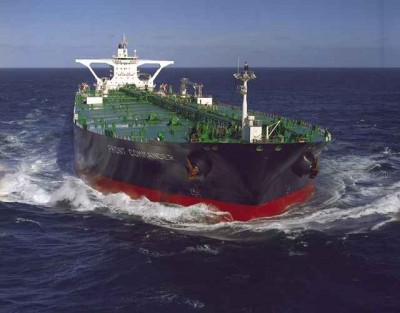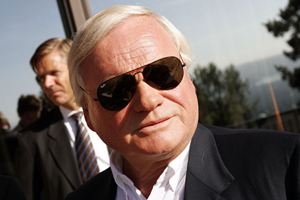Norwegian shipowner and industrialist John Fredriksen, long ranked among the wealthiest men in the world, remains in command of Oslo-based tanker-owning company Frontline. Tankers have always been Fredriksen’s passion, and despite huge losses in a miserable market, he doesn’t seem inclined to let Frontline sink.

“John Fredriksen has a desire that no financial creditors will lose on Frontline,” said his right-hand man Tor Olav Trøim after the stocklisted owner of the world’s biggest tanker fleet announced third-quarter losses of USD 166.5 million and a looming cash crisis. “This is all about our credibility in the capital markets. No one has lost on Fredriksen. Now John is 67 years old and will continue to meet his obligations.”
Trøim, who has worked closely with Fredriksen for nearly two decades, ruled out bankruptcy. “No one has anything to earn on a bankruptcy,” he told newspaper Dagens Næringsliv (DN). “All the contact we have speaks to that. But it can be necessary to shove some obligations forward in time.”
The “contact” Trøim was referring to involves crisis talks Frontline officials are having with the company’s banks and other creditors. Various options include efforts to sell off vessels, raise new capital, alter existing charter agreements, extend loan repayment terms and spin off new vessels under construction (newbuildings) into a separate company. Trøim’s very presence at the presentation in Oslo of Frontline’s latest results was an indication of how serious the situation is.

He invited to what he called kreativ dugnad in Norwegian, which roughly translates to a creative common effort by all parties involved in Frontline to find a way out of the crisis. That will largely need to involve massive reduction in the cost of owning and operating Frontline’s large fleet, to bring it into balance with currently low revenue levels that are well under what it takes for a Frontline ship to break even. Frontline’s history of paying out handsome dividends to its shareholders may make them more inclined to go along with dugnad efforts, not least if they realize that the dividends paid out over the years have something to do with the company’s current shortage of cash.
Frontline is by no means the only tanker owner struggling in a charter market where rates have collapsed. Current daily charter rates for Frontline’s large oil tankers are far below the daily cost (around USD 30,000) of operating the enormous vessels. Fredriksen, Frontline’s major stockholder, is also known for having built up a modern and relatively expensive fleet. Frontline has actively ordered new vessels at shipyards and, noted DN, bought five Suezmax tankers for USD 240 million in 2008.
“That was a mistake,” Trøim candidly told DN. Time has shown that values topped out in 2008, leaving Frontline with heavy financial commitments on devalued assets. “Everyone who’s been involved with this feels enormous responsibility. In hindsight, we should have had fewer newbuildings (new vessels ordered at shipyards) and more ships (leased out) on long-term time charters.”
Release of Frontline’s heavy losses, along with a warning the company may run out of cash during the first quarter of 2012, caused its shares to dive by 43.5 percent on Tuesday, to just NOK 17.35 per share. That compares to NOK 169.50 earlier this year. Frontline’s battered shares edged up a bit early Wednesday, trading at NOK 18.45 by mid-morning.
The dive means huge losses, at least on paper, for Fredriksen himself, but Trøim claims Fredriksen is committed to saving the company. Other important players don’t seem to doubt that. Hans Christian Kjelsrud, head of ship finance for lender Nordea Bank, called Frontline’s “dugnad” plan “sensible … for all stakeholders, both shareholders, banks, bond holders and leasing companies.” He told DN he expected the poor market to last another 12 to 24 months, and indicated Nordea had confidence in, and respect for, Fredriksen.
Analysts also seemed supportive. Erik Nikolai Stavseth of Arctic Securities told DN that Trøim was “clear” and didn’t try to make the situation appear rosier than it was. Ole G Stenhagen of SEB Enskilda also appeared confident that Frontline’s problems “have the full and undivided attention” of the Fredriksen group. Trøim said the group aimed to have a rescue plan in place by December 31.
Views and News from Norway/Nina Berglund
Please support our stories by clicking on the “Donate” button now:

